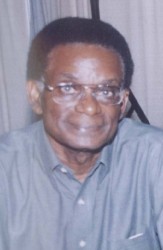Armed with draft legislation, the State Assets Recovery Unit (SARU) will be meeting with the World Bank’s Stolen Assets Recovery Initiative (StAR) in mid-January to plot the way forward in transforming the unit into an agency with the authority to freeze assets and proceed with civil litigation alongside criminal investigations.
“What we are trying to do is build from scratch an organisation designed to prevent the stealing of public assets now, and in the future as well as to capture and return some of the property that was stolen in the past, the recent past. So we have a two-fold obligation. To do that we need to establish the capacity to make that pursuit and that means building up our strength in many different [ways] field, organisational, legally, personnel, resources-wise, contacts overseas and all that sort of thing…it is an evolving global structure of which we are part that we are trying to build a net,” SARU head Dr Clive Thomas told Stabroek News in an interview.
He emphasised that going forward, the unit needs to be a fully independent agency being propelled by autonomous forces to ensure it can pursue investigations free of favour.

“I hope to get it done as soon as possible. I would have liked to get it done yesterday so it is the most pressing need that we have now because we don’t want to rely on other agencies to take action, we want to be able to do our own execution,” Thomas said of the pressing need to introduce a bill that will transform the unit into an agency.
He related that on Monday, he met the unit’s technical advisor Brian Horne and there is now preliminary draft legislation which requires further input from SARU.
He disclosed that two Thursdays ago, he spoke with a team from StAR to arrange a visit to Guyana which resulted in a mid-January date being decided upon. StAR will assist in the training in asset recovery which Thomas explained Guyana is in need of.
According to the economist, there has been no pause in the work being conducted by SARU. However, he acknowledged that there is a reliance on other agencies such as the Director of Public Prosecutions (DPP) to move ahead with criminal charges should the investigations find that laws were circumvented.
Thomas said the findings coming from the numerous forensic audits could mean that penalties may include a conviction based on the balance of probabilities. He said upon looking into a person of interest’s financial holdings, and given their earning potential, the unit could ascertain that their assets are well above their means.
However, there is an impasse as it relates to filing charges. “We have a concern about Pradoville [2] that we had to refer to, under the Constitution, the Director of Public Prosecutions because only she can bring a criminal charge and even though criminal charges take precedence over civil charges, we would like the agency to also have the power to go to the civil courts to seek recompense of that misappropriation of public funds,” Thomas said.
A SARU report on Pradoville 2 had been forwarded to Attorney-General Basil Williams. “The lands were sold to the former ministers and known friends and associates of the previous regime. At the time of the sale the lands were grossly undervalued and sold substantially lower than the market value for the land thereby depriving the state of its full benefits,” it had said.
“The actions of the former cabinet Ministers have shown that they have wilfully neglected to perform their duties without reasonable excuse or justification to such an extent that it amounted to an abuse of the public trust in the office holders,” the document charged.
The DPP Shalimar Ali-Hack has been identified as among those who benefitted from the land allocation in the prime area and it has been said that this could represent a serious conflict of interest.
Thomas said apart from the activities at the local level, there is need to have technical experts from agencies such as FraudNet for guidance and training. FraudNet is an international network of independent lawyers who are expert civil asset recovery specialists. It was founded in 2004 by the Paris-based International Chamber of Commerce (ICC).
The organisation was recently in Guyana for a training workshop for local auditors and the team subsequently approached SARU and discussed technical assistance. Thomas said an arrangement being worked out with FraudNet would see the organisation being recompensed by recovery.
He said that although technical expertise is being made available through various channels such as the ICC, the World Bank and the United Nations due to Guyana being a member of the UN Convention Against Corruption “at some point we have to employ international experts, we can’t expect people to do that for free.”
He asserted that FraudNet has been responsible for the recovery of billions in participating countries.




